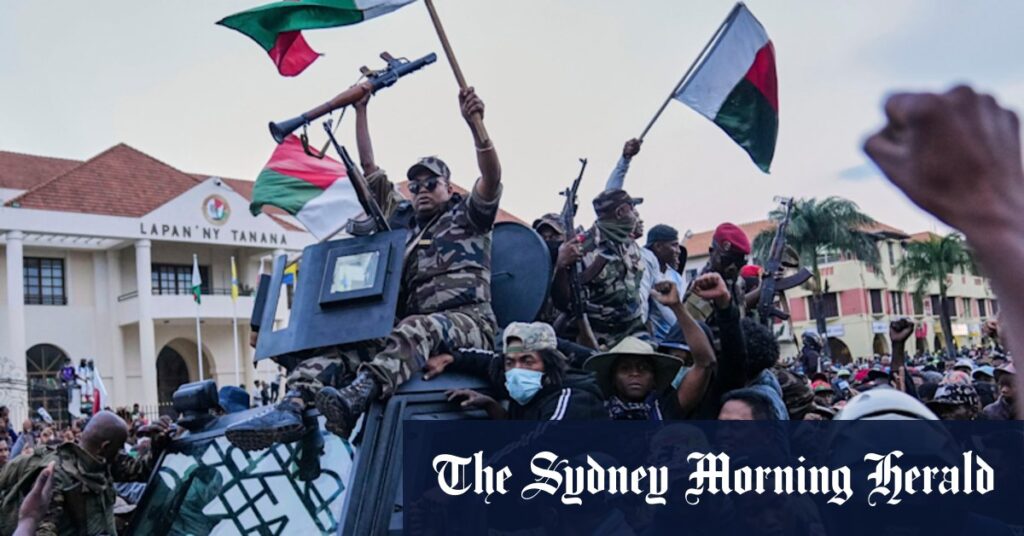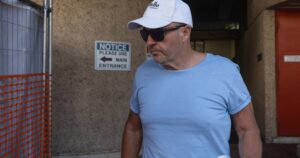
Antananarivo, Madagascar: In a dramatic turn of events, Madagascan President Andry Rajoelina announced late Monday that he has fled the country due to threats to his life following a military rebellion. In a speech broadcast on social media from an undisclosed location, Rajoelina stopped short of resigning, despite mounting pressure and protests led by the country’s Generation Z.
The announcement follows a significant escalation on Saturday when an elite military unit, CAPSAT, joined the anti-government protests, demanding the resignation of Rajoelina and his ministers. This move prompted Rajoelina to accuse the unit of attempting an illegal power grab on the Indian Ocean island, leading to his departure.
Military Rebellion and Social Media Broadcast
Rajoelina’s speech, intended for national television, was delayed as soldiers reportedly tried to seize control of the state broadcaster’s facilities. Eventually, the address was streamed on the presidency’s official Facebook page. It marked Rajoelina’s first public appearance since the CAPSAT unit sided with protesters in Antananarivo’s main square over the weekend.
In his address, Rajoelina called for dialogue and adherence to the Constitution. He did not disclose his current location or the means of his departure, although reports suggest he left on a French military plane. The French Foreign Ministry has declined to comment on these claims.
Historical Context and Current Unrest
Madagascar, a former French colony, has a tumultuous history of political instability. The current unrest, which began on September 25, was initially sparked by chronic water and electricity shortages but has evolved into widespread dissatisfaction with Rajoelina’s administration. The protests are the most significant since Rajoelina’s rise to power in 2009, following a military-backed coup.
The CAPSAT unit, instrumental in Rajoelina’s initial ascent, now appears to be in control, with support from other military factions, including the gendarmerie. Colonel Michael Randrianirina, a CAPSAT commander, stated the army responded to public demands, denying it was a coup. He emphasized that the future of Madagascar should be determined by its people.
“The army has responded to the people’s calls,” Colonel Randrianirina said, “but it is up to the Madagascan people to decide what happens next.”
International Reactions and Implications
The international community is closely monitoring the situation. The United States embassy has advised its citizens to remain sheltered due to the volatile environment, while the African Union has urged both civilian and military factions to exercise restraint. The United Nations has criticized the Madagascan government’s response to the protests, which has reportedly resulted in at least 22 deaths, a figure the government disputes.
The protests, led by a group calling itself “Gen Z Madagascar,” have brought attention to issues such as poverty, corruption, and the cost of living. The movement has drawn inspiration from recent uprisings in Nepal and Sri Lanka, leveraging social media to mobilize support.
Looking Ahead: Political Uncertainty and Potential Outcomes
As Madagascar grapples with this crisis, the political future remains uncertain. Rajoelina, who first gained prominence in 2009 and was re-elected in a controversial 2023 election, faces significant challenges. The recent rebellion by CAPSAT, once his ally, underscores the shifting power dynamics within the country.
Meanwhile, Madagascar’s former Prime Minister and a close adviser to Rajoelina have reportedly fled to Mauritius, adding another layer to the unfolding political drama. The Mauritian government has expressed dissatisfaction with their arrival.
Madagascar’s history of coups and political crises since its independence in 1960 looms large over the current situation. As the nation stands at a crossroads, the path forward will depend on the actions of both its leaders and its citizens in the coming days.







